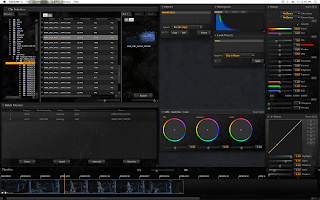
We researched many different potential workflows for RED and Avid and even looked into our options with Final Cut Pro just to compare. I was and still am insistent that Avid Media Composer is the platform with which to edit this film. While Final Cut might be more appealing because of it’s apparent ease-of-use with RED footage, Avid is a platform that I personally want to spend more time with.
There has only been one previous RED shoot at our school, and they cut on Final Cut Pro. Typically, third-year editors are required to edit on Avid. However, the previous film was given a special exception because RED (it seemed) would play nicer with Final Cut. This time, everyone assumed we would cut Final Cut and the faculty would again have to grant an exception. I insisted that Avid would work, and that we should do everything we could to prove that it’s a viable workflow at our school. After all, this is a school, and we should be learning things. It’s not a challenge to do it on Final Cut. We wouldn’t learn nearly as much as we would cutting RED on Avid. Plus, everyone kept saying it would never work and we would end up switching to Final Cut. I want to prove them all wrong.
Anyway, our workflow is basically this.
Raw R3D RED files are duplicated, one set is given to Eric, our director of photography, and the other is given to me.
Eric uses his to do color correction in Apple’s Color program, for later high-res export.
I take my copies and ingest them with REDCINE-X (build 183, in this case) to convert to MXF, AAF, and ALE for Avid. Eric comes in during ingest to make a light first-pass of color correction to get the footage close to his intentions for the final look of the film.
REDCINE-X allows me to create my MXFs in 1080p/23.968fps.
I import the ALE generated by REDCINE-X and relink it to the MXF media. Then I start editing.
Once the cut is done, I export an EDL from Avid. This is where things get a little weird.
Since we’re incorporating elements from multiple sources (RED live action footage, animation elements, visual effects with Adobe After Effects), we elected to use Final Cut Pro as our final conform platform. (This decision was also influenced by the fact that if we wish to finish to anything higher than 1080p in Avid, we’d have to have Avid’s DS finishing system, which neither the school nor any of us have the money to buy or rent.)
So, we bring in the EDL from Avid, relink it with the ProRes 4444 exports that Eric has created with Apple’s Color, and rebuild the edit in higher resolution in Final Cut.
This part is tenuous at the moment and we’re not going to know for sure that it works entirely until we start doing it. Fingers crossed! But we’ll get to that part when we do. For the time being, I’m focused on achieving picture lock by the end of the term…
